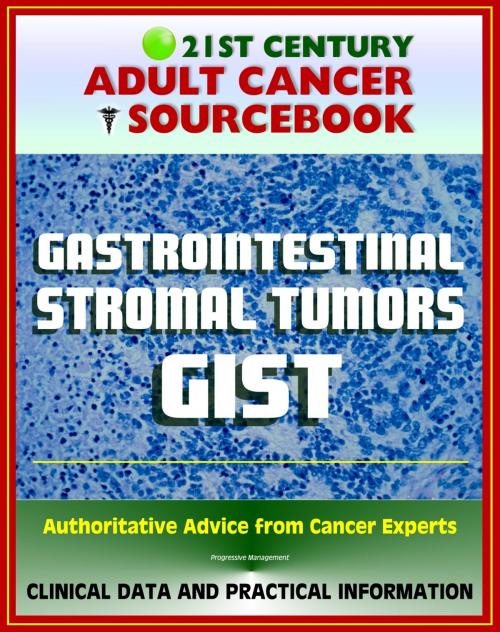21st Century Adult Cancer Sourcebook: Gastrointestinal Stromal Tumors (GIST) - Clinical Data for Patients, Families, and Physicians
Nonfiction, Health & Well Being, Health, Ailments & Diseases, Cancer, Medical| Author: | Progressive Management | ISBN: | 9781466051164 |
| Publisher: | Progressive Management | Publication: | October 7, 2011 |
| Imprint: | Smashwords Edition | Language: | English |
| Author: | Progressive Management |
| ISBN: | 9781466051164 |
| Publisher: | Progressive Management |
| Publication: | October 7, 2011 |
| Imprint: | Smashwords Edition |
| Language: | English |
Authoritative information and practical advice from the nation's cancer experts about gastrointestinal stromal tumors (GIST) includes official medical data on signs, symptoms, early detection, diagnostic testing, risk factors and prevention, treatment options, surgery, radiation, drugs, chemotherapy, staging, biology, prognosis, and survival, with a complete glossary of technical medical terms and current references.
Starting with the basics, and advancing to detailed patient-oriented and physician-quality information, this comprehensive in-depth compilation gives empowered patients, families, caregivers, nurses, and physicians the knowledge they need to understand the diagnosis and treatment of GIST.
Comprehensive data on clinical trials related to GIST is included - - with information on intervention, sponsor, gender, age group, trial phase, number of enrolled patients, funding source, study type, study design, NCT identification number and other IDs, first received date, start date, completion date, primary completion date, last updated date, last verified date, associated acronym, and outcome measures.
Gastrointestinal stromal tumors (GISTs) may be malignant (cancer) or benign (not cancer). They are most common in the stomach and small intestine but may be found anywhere in or near the GI tract. Some scientists believe that GISTs begin in cells called interstitial cells of Cajal (ICC), in the wall of the GI tract. Genetic factors can increase the risk of having a gastrointestinal stromal tumor.
The genes in cells carry the hereditary information received from a person’s parents. The risk of GIST is increased in people who have inherited a mutation (change) in a certain gene. In rare cases, GISTs can be found in several members of the same family. GIST may be part of a genetic syndrome, but this is rare. A genetic syndrome is a set of symptoms or conditions that occur together and is usually caused by abnormal genes. The genetic syndromes Neurofibromatosis type 1 (NF1) and Carney triad have been linked to GIST. Possible signs of gastrointestinal stromal tumors include blood in the stool or vomit.
Extensive supplements, with chapters gathered from our Cancer Toolkit series and other reports, cover a broad range of cancer topics useful to cancer patients. This edition includes our exclusive Guide to Leading Medical Websites with updated links to 81 of the best sites for medical information, which let you quickly check for updates from the government and the best commercial portals, news sites, reference/textbook/non-commercial portals, and health organizations. Supplemental coverage includes:
Levels of Evidence for Cancer Treatment Studies
Glossary of Clinical Trial Terms
Clinical Trials Background Information and In-Depth Program
Clinical Trials at NIH
How To Find A Cancer Treatment Trial: A Ten-Step Guide
Taking Part in Cancer Treatment Research Studies
Access to Investigational Drugs
Clinical Trials Conducted by the National Cancer Institute's Center for Cancer Research at the National Institutes of Health Clinical Center
Taking Time: Support for People with Cancer
Facing Forward - Life After Cancer Treatment
Chemotherapy and You
Authoritative information and practical advice from the nation's cancer experts about gastrointestinal stromal tumors (GIST) includes official medical data on signs, symptoms, early detection, diagnostic testing, risk factors and prevention, treatment options, surgery, radiation, drugs, chemotherapy, staging, biology, prognosis, and survival, with a complete glossary of technical medical terms and current references.
Starting with the basics, and advancing to detailed patient-oriented and physician-quality information, this comprehensive in-depth compilation gives empowered patients, families, caregivers, nurses, and physicians the knowledge they need to understand the diagnosis and treatment of GIST.
Comprehensive data on clinical trials related to GIST is included - - with information on intervention, sponsor, gender, age group, trial phase, number of enrolled patients, funding source, study type, study design, NCT identification number and other IDs, first received date, start date, completion date, primary completion date, last updated date, last verified date, associated acronym, and outcome measures.
Gastrointestinal stromal tumors (GISTs) may be malignant (cancer) or benign (not cancer). They are most common in the stomach and small intestine but may be found anywhere in or near the GI tract. Some scientists believe that GISTs begin in cells called interstitial cells of Cajal (ICC), in the wall of the GI tract. Genetic factors can increase the risk of having a gastrointestinal stromal tumor.
The genes in cells carry the hereditary information received from a person’s parents. The risk of GIST is increased in people who have inherited a mutation (change) in a certain gene. In rare cases, GISTs can be found in several members of the same family. GIST may be part of a genetic syndrome, but this is rare. A genetic syndrome is a set of symptoms or conditions that occur together and is usually caused by abnormal genes. The genetic syndromes Neurofibromatosis type 1 (NF1) and Carney triad have been linked to GIST. Possible signs of gastrointestinal stromal tumors include blood in the stool or vomit.
Extensive supplements, with chapters gathered from our Cancer Toolkit series and other reports, cover a broad range of cancer topics useful to cancer patients. This edition includes our exclusive Guide to Leading Medical Websites with updated links to 81 of the best sites for medical information, which let you quickly check for updates from the government and the best commercial portals, news sites, reference/textbook/non-commercial portals, and health organizations. Supplemental coverage includes:
Levels of Evidence for Cancer Treatment Studies
Glossary of Clinical Trial Terms
Clinical Trials Background Information and In-Depth Program
Clinical Trials at NIH
How To Find A Cancer Treatment Trial: A Ten-Step Guide
Taking Part in Cancer Treatment Research Studies
Access to Investigational Drugs
Clinical Trials Conducted by the National Cancer Institute's Center for Cancer Research at the National Institutes of Health Clinical Center
Taking Time: Support for People with Cancer
Facing Forward - Life After Cancer Treatment
Chemotherapy and You















